Written by Leigh Kolb.To celebrate the
20th anniversary of Quentin Tarantino’s major directorial debut,
Reservoir Dogs (1992)
and
Pulp Fiction (1994) were shown in theaters on Dec. 4 and 6, respectively, as special engagements.
While
Reservoir Dogs solidified Tarantino’s spot in Hollywood,
Pulp Fiction made him a star. It won the Palme d’Or at the Cannes Film Festival, the Academy Award for Best Screenplay (it was nominated for Best Picture) and John Travolta, Samuel L. Jackson and Uma Thurman were nominated for Academy Awards.
The film opens with a couple (Pumpkin/Ringo and Honey Bunny/Yolanda) eating at a diner. The two are discussing their next robbery attempt and realize robbing a restaurant would maximize their profits. The banter between the two shows that they are partners, and are in love.
As they enact their plan, they stand up with their guns. Pumpkin announces that this is a robbery, and Honey Bunny screams:
“Any of you fucking pricks move, and I’ll execute every motherfucking last one of ya!”
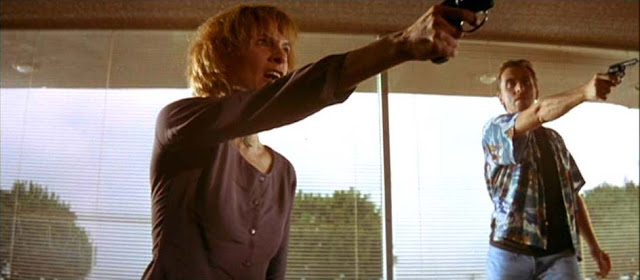 |
| Honey Bunny/Yolanda, left, screams and threatens restaurant patrons as Pumpkin looks on. |
The iconic sounds of “Miserlou,” by Dick Dale and His Del Tones begin, and the audience quickly realizes that unlike Reservoir Dogs, women will have a voice in Pulp Fiction.
Like Reservoir Dogs, Pulp Fiction examines masculinity–glorifying and critiquing it. Instead of conversations about women, however, women have integral roles in each of the intertwining narratives.
Vincent Vega & Marcellus Wallace’s Wife
When Vincent and Jules discuss the meaning of a foot rub, they are speaking about intimacy and what it means to touch a woman’s feet. The rumor is that their boss, Marcellus Wallace, had a man pushed off a building for rubbing his wife’s feet. They’re exploring something beyond a foot rub (although Tarantino himself does
love feet). On some level, they’re exploring male/female interactions and levels of intimacy.
Vincent tells Jules that Marcellus asked him to take his wife Mia out, and it’s clear that this woman invokes intimidation in men. Vincent goes to Lance’s house (his drug dealer) to purchase some heroin. He self-medicates before going to pick up Mia. She’s left a note on the door to come in, and she watched Vincent enter the house on security camera footage and speaks to him over an intercom. She is god-like in this scene (and while it fits the narrative, we know that Uma Thurman is also a
god/muse to Tarantino).
Mia self-medicates with cocaine, and the scene at Jack Rabbit Slim’s makes the audience feel high. Mia chooses the restaurant and made the reservation (she is in control), and the two engage in friendly banter. She was an actress, and tells him about her failed television series, Fox Force Five. Vincent confronts her about the foot rub rumor, and she denies it, pointing out that a husband protecting his wife is “one thing,” but that was ridiculous. She says:
“Truth is, nobody knows why Marsellus threw Tony out of that fourth-story window except Marsellus and Tony. When you little scamps get together, you’re worse than a sewing circle.”
Here, the men are gossiping and being “silly,” which are most often the stereotyped flaws of female characters.
The two dance in a twist competition–upon her insistance–and win the trophy. The dance itself is one in which no one really leads; they are partners.
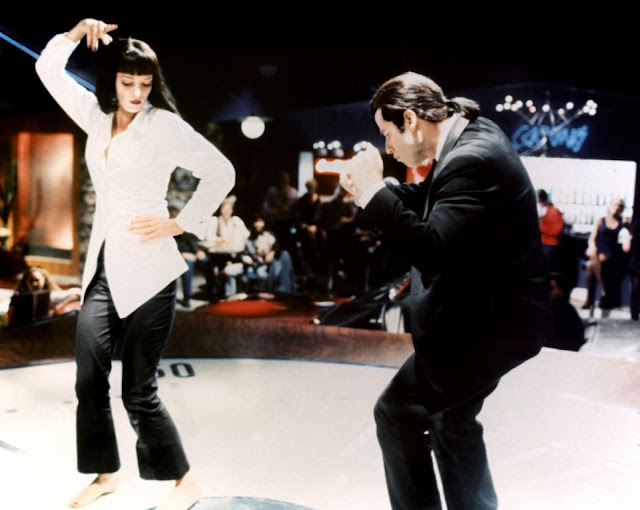 |
| Mia and Vincent dance as equals. |
Back at the Wallace mansion, Mia finds the baggie of heroin in Vincent’s coat pocket, mistakes it for cocaine, and snorts a long line, immediately overdosing. She’s a modern-day damsel in distress, whose distress is really a simple mistake.
Vincent rushes her to Lance’s house, and Lance yells, “You fucked her up, you fix her!” But we know this isn’t the case. Again, the assumption is that the man is at fault, and the woman is helpless, but that isn’t how they end up here. Everyone bumbles around the apartment, trying to figure out the adrenaline shot (at one point Lance is in a cluttered room looking for a medical book, and the board game “Chauvinist Pigs” is perched atop a pile). No one in this scene is truly heroic or capable, which makes it feel realistic. Vincent successfully injects the adrenaline into Mia’s heart, and Vincent takes her back home. They, and we, sober up fast.
The Gold Watch
The story of the gold watch, passed down to Butch from his great-grandfather, to his grandfather, to his father and then to him, is essentially a story about the decline in traditional American manhood. By the time the watch got to Butch’s father in the Vietnam War, he was a POW and had to “hide it in his ass” for years so he could pass it down to his son. The shift in American war culture/patriotism between WWII and Vietnam was stark. The “Greatest Generation” of American men in the second world war gave birth to boys who would serve in Vietnam, a war that utilized a draft and was met with protest and hostility. By the time Butch becomes an adult man, he is fighting, yes, but for money and not his country. His war is internal, and devoid of the heroism from a few generations ago. (This crisis of a lack of clearly defined masculinity is the cornerstone of Gen X novels/films such as Fight Club, which explores at length this generation of young men with no great war.)
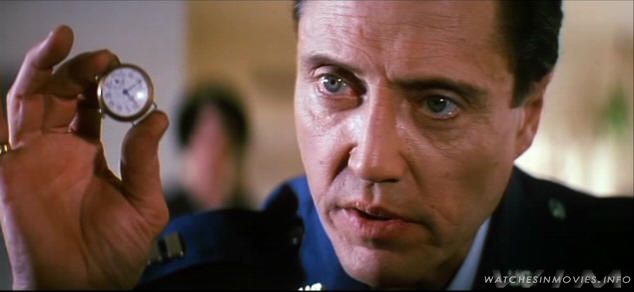 |
| Captain Koons presents a young Butch with his father’s watch. |
Butch’s desperation to have that gold watch with him, even eventually risking his life to do so, is indicative of his desperation to hold on to this generationally diluted manhood.
Butch doesn’t throw the fight that he’d fixed with Marcellus, and instead wins and accidentally kills his opponent. In the getaway cab ride, the female cab driver asks him what it’s like to kill a man, because it’s a subject she’s “very interested” in. She seems more interested than he does, in fact.
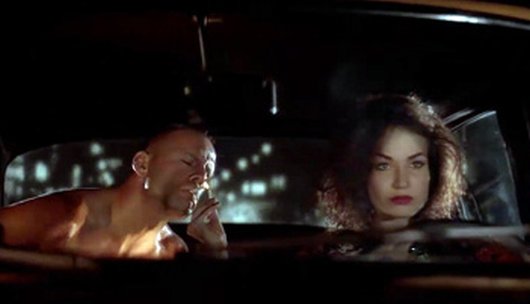 |
| Esmerelda lights Butch’s cigarette. |
When he’s back at the hotel room with his girlfriend Fabienne, the two share intimate moments and comedic dialogue. Fabienne seems silly and child-like, but Butch is sweet and respectful to her (although he erupts when he realizes she’s forgotten the watch, he quickly apologizes and says he was to blame). As she’s lying on the bed wishing for a pot belly, she says:
“I don’t give a damn what men find attractive. It’s unfortunate what we find pleasing to the touch and pleasing to the eye is seldom the same.”
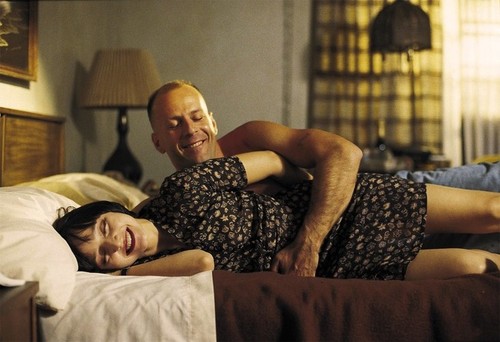 |
| Fabienne and Butch. |
She requests and receives “oral pleasure” from Butch, and in the hotel room scenes, the audience sees more of Butch’s body than Fabienne’s. Again, she seems naive and childish, but their relationship is equitable and for the most part, enjoyable to watch. Maybe Butch has a similar innocence, but it is well-guarded under his outward masculinity.
The next morning, when he flies into a rage about the watch, warfare and explosions blast on the television in their room, another reminder of the distance between Butch and that celebrated masculine pastime.
He goes off on a quest to retrieve the gold watch before they flee to Knoxville (since Marcellus will be trying to find him and kill him for not throwing the fight). He takes off in a Honda hatchback, and gets to his apartment. Vincent is already there, sent to kill him, but he’s on the toilet reading
Modesty Blaise, who debuted as a female action hero in a comic strip, collection of stories/novel and films of the same name in the 1960s. (Tarantino is a
Blaise fan, and certainly
Kill Bill‘s The Bride shares many similarities with the female protagonist.)
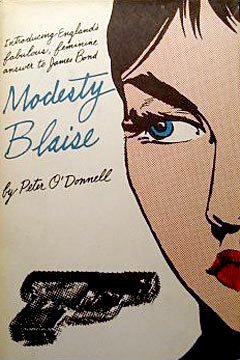 |
| Modesty Blaise, a 1960s crime series with a female protagonist. |
Butch picks up Vincent’s gun and kills him as he steps out of the bathroom. When he escapes, he runs into Marcellus (women flock to the sides of Butch and Marcellus to help them), and the two end up in a depraved dungeon of a pawn shop with a racist owner. When Butch breaks free as Marcellus is being raped by security guard Zed, he can’t leave. He goes back down and kills the shop owner with a sword, and breaks Marcellus free (who then shoots Zed in the groin). There are obvious masculinity issues here, from the anal rape (my gosh what would Freud do with Butch’s narrative) to the phallic sword, Marcellus and Butch agree that they are even, and Butch will never utter a word about the rape.
Butch takes off on Zed’s motorcycle and arrives back to pick up Fabienne. Some kind of post-modern manhood has been achieved, and he’s free to go on–with the gold watch.
The Bonnie Situation
When Jules and Vincent are saddled with the problem of a dead man in their car, they turn to Jimmie and go to his house. He is adamant that they take care of their situation soon, because his wife Bonnie is about to come home. He says:
“Now don’t you fucking realize man that if Bonnie comes home and finds a dead body in her house, I’m gonna get divorced, all right. No marriage counselor, no trial separation. I’m gonna get fuckin’ divorced. Okay? And I don’t wanna get fuckin’ divorced. Now then, you know, I mean, I wanna help you but I don’t wanna lose my wife doin’ it, all right.”
This honest admission of a husband who doesn’t want to lose his wife is refreshing. She’s not a nag, she’s not a bitch, but she’s his wife and he wants to be married to her.
Marcellus calls Winston “The Wolf” Wolfe, who is the antithesis of Jimmie. The Wolf is partying with glamorous women at 9 a.m., clearly living like James Bond and speeds to Jimmie’s in a silver sports car. Jimmie is waiting for his wife to get home from work, brews fancy coffee and is hesitant to give The Wolf their best linens to clean up the mess. As a trade, The Wolf gives him a stack of bills to buy themselves a new bedroom set.
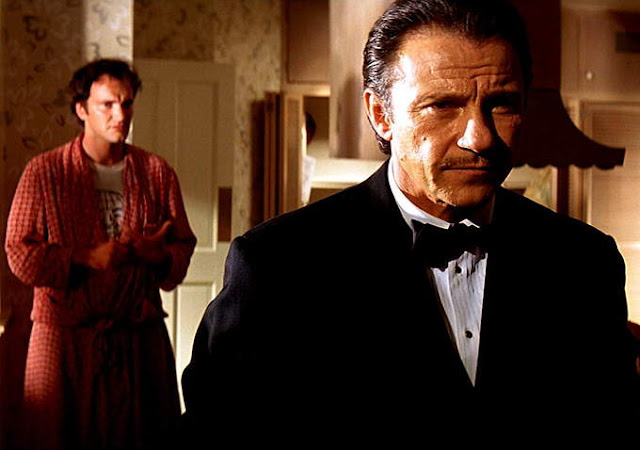 |
| Jimmie’s “feminine” tendencies and The Wolf’s classic masculinity complement one another. |
These two men–Jimmie and The Wolf–exist in opposite worlds and diametrically opposing masculinities. However, the two of them working together solves problems. This acceptance of and need for different shades of stereotypical masculinity and femininity reminds the audience that Tarantino is aware and critical of gender performance.
When they drop the cleaned-out car to Monster Joe’s Truck and Tow, Joe’s daughter Racquel comes to meet them. The Wolf says, “Someday, all this will be hers.” This is a nod to the next generation of gender roles–whether it be women running junk yards, crime rings or killing sprees, Tarantino’s women are not shut in dainty boxes.
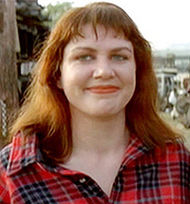 |
| Racquel, the heiress to Monster Joe’s Truck and Tow. |
During the epilogue, we are again in the diner where Pumpkin and Honey Bunny/Yolanda are holding up the customers. Vincent and Jules are there (Vincent is in the bathroom during most of the scene), and Jules engages in a stand-off between the two while trying to talk Pumpkin out of doing what they’re doing. He allows them to collect the customers’ cash without hurting anyone. Yolanda becomes unhinged and pitiful in this scene, and a viewer may be dismayed at Tarantino’s decision to make the woman fall apart at this very moment, and that this shows her weakness. However, we must realize that many of the characters throughout the film have shown fallibility or been in positions of weakness (Vincent’s self-medication and debilitating nerves about Mia, Mia’s overdose, Marcellus’s sexual assault and Jimmie’s anxiety about his wife). This does not mean anything except that the characters are human.
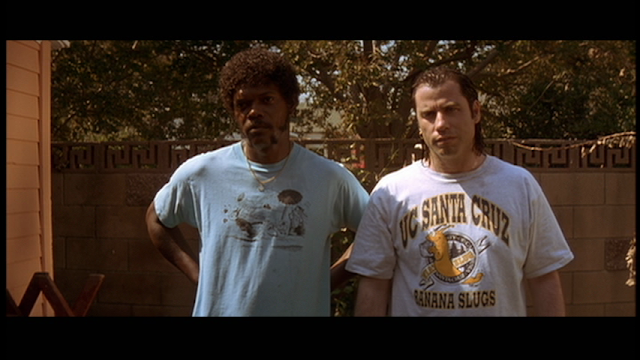 |
| Jules and Vincent have been scrubbed clean and left to look like “dorks,” somehow emasculated without their black suits. |
Humans are not one-dimensional caricatures. They commit crimes, they overdose, they are racist, sexist and complex. As long as men and women alike are portrayed in all aspects of the human experience in a film and are reflections of reality (no matter how unpleasant that reality is), then authenticity can be achieved.
Pulp Fiction, in all of its gore, turns a critical eye on masculinity and femininity and offers a more nuanced take on its male and female characters than films of similar genres. And as Tarantino’s later
films went on to have female characters who take active and leading roles, The Wolf was right in pointing out that “all this” will someday be a woman’s, too.
—
Leigh Kolb is a composition, literature and journalism instructor at a community college in rural Missouri.









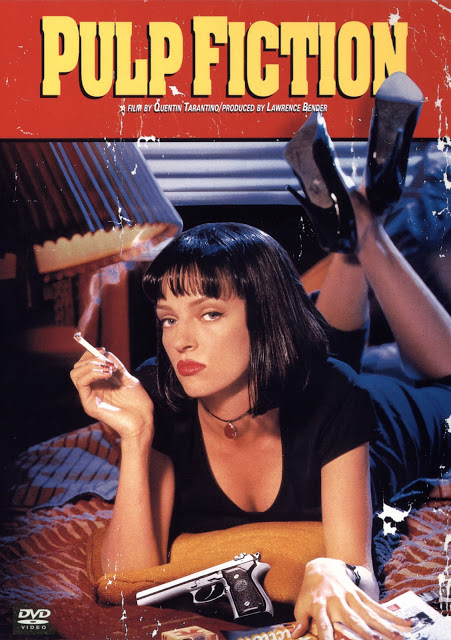

Dongsquad 420
You’ve written a remarkably brief and well thought out synopsis of the role that gender plays in Pulp Fiction. No idea why no one has commented on this yet, but your examination has really made me re-think the movie and how Tarantino has eliminated gender tropes in each of his characters. I suppose the reason I never thought about it is that Tarantino’s script is so true to life, that you forget that it’s written within the context of a movie, effectively bridging the gap between fiction and real life, however pulpy it may be.
This was excellent. I really enjoy the realistic feeling that comes from Tarantino films, and the human element that he interjects; humans fuck up all the time. Very well examined.